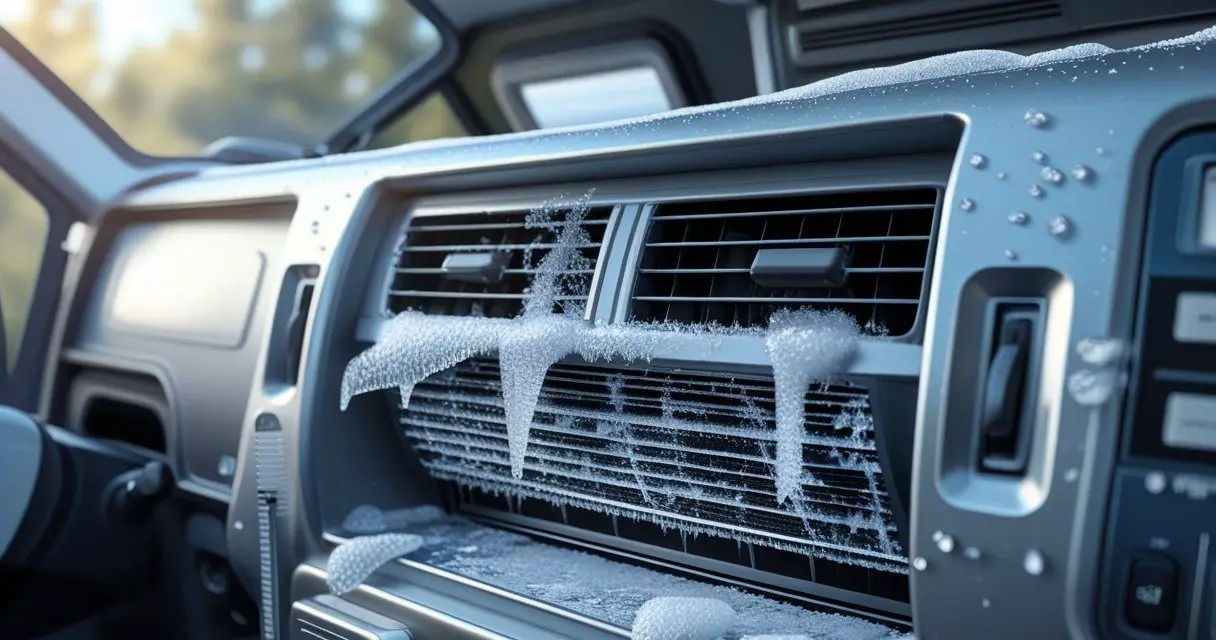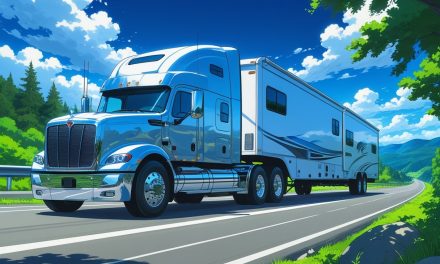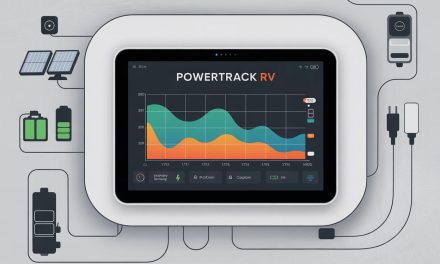Would you like to save this article?
Yes, your RV air conditioner can freeze up, and it happens more often than you might think. When ice builds up on the coils, airflow drops, cooling stops, and your RV gets warmer instead of cooler.
This problem can turn a comfortable trip into a frustrating one if you don’t know what’s going on.
You might notice weak airflow, water dripping where it shouldn’t, or even a block of ice forming inside the unit. These signs point to issues like dirty filters, restricted airflow, high humidity, or low refrigerant.
The good news is that most of these problems are preventable with a little maintenance and attention.
Key Takeaways
- RV AC units can freeze when airflow or cooling balance is disrupted
- Simple maintenance steps help prevent most freeze-up problems
- Some situations require professional service to restore proper function
Can RV AC Freeze Up?
Yes, an RV air conditioner can freeze up under certain conditions. Ice buildup usually happens when airflow is restricted or when the cooling system is not balanced, leading to reduced performance and possible damage if ignored.
What Happens When an RV AC Freezes
When your RV AC freezes, ice forms on the evaporator coil inside the unit. This coil is supposed to absorb heat, but when it gets too cold, moisture in the air turns into ice.
Once ice builds up, the coil cannot absorb heat properly, and the cooling process slows down. As the ice thickens, airflow through the vents becomes weaker.
You may notice the AC running but not blowing cold air into the RV. In some cases, the unit may shut down completely to prevent further damage.
If the freezing continues, the compressor and other parts of the system may be strained. This can shorten the life of your AC and lead to costly repairs.
Common Signs of Freezing
You can usually spot a frozen AC by checking for these signs:
- Weak airflow: Air from the vents feels limited or blocked.
- Warm air: The unit runs but does not cool the RV.
- Visible ice: Frost or ice appears on the coils or even the outside of the unit.
- Water leaks: As the ice melts, water may drip inside or outside the RV.
Sometimes you may also hear unusual sounds, like the fan struggling to push air through. A musty smell can appear if moisture builds up around the coils.
If you notice one or more of these signs, turn off the AC and let it thaw before running it again. This prevents further damage and gives you time to check for clogged filters, blocked vents, or other airflow issues.
Primary Causes of RV AC Freezing
Your RV air conditioner can freeze when airflow is blocked, refrigerant levels drop, the thermostat misreads temperatures, or the condenser becomes dirty or damaged. Each of these problems affects how the system balances cooling, airflow, and moisture control.
Restricted Airflow Issues
Restricted airflow is one of the most common reasons your RV AC freezes. When air cannot move freely across the evaporator coils, the coils get too cold and ice begins to form.
Dirty air filters are a leading cause. A clogged filter reduces the amount of warm air passing over the coils, which makes freezing more likely.
Cleaning or replacing filters every few weeks during heavy use helps prevent this. Blocked vents or closed registers can also limit airflow.
Make sure all interior vents are open and that nothing is obstructing return air pathways. Even partially blocked ducts can reduce efficiency and lead to ice buildup.
You should also check the blower fan. A weak or failing fan cannot circulate enough air, which creates the same freezing conditions.
If the fan blades are dirty or the motor is worn, airflow drops and the system struggles to keep up.
Low Refrigerant Levels
Low refrigerant levels can cause the evaporator coil to become colder than normal. When this happens, condensation freezes on the coil instead of draining away.
Refrigerant does not get “used up” over time. If your RV AC is low, it usually means there is a leak.
Leaks can occur in the coils, connections, or refrigerant lines. Signs of low refrigerant include weak cooling, longer run times, and ice forming on the evaporator.
You may also hear hissing near the lines if the leak is significant. Since handling refrigerant requires special tools and training, you should have a licensed technician inspect and repair the system.
Adding refrigerant without fixing the leak will only provide a short-term solution.
Thermostat Malfunctions
A faulty thermostat can cause your AC to run longer than it should, which leads to freezing. If the thermostat does not sense the correct room temperature, it may keep the compressor running even when cooling is no longer needed.
Sometimes the problem is as simple as an incorrect setting. If the thermostat is set too low, the system may overcool and freeze.
Keeping the setting at or above 60°F helps reduce this risk. Wiring issues, sensor problems, or calibration errors can also affect thermostat performance.
If your AC cycles irregularly or never seems to shut off, the thermostat may need adjustment or replacement. Replacing an outdated thermostat with a modern digital model often improves accuracy and prevents freeze-ups caused by poor temperature control.
Dirty or Faulty Condenser
The condenser coil releases heat from the refrigerant. If it becomes dirty or blocked, the system cannot get rid of heat efficiently.
This causes pressure changes that make the evaporator coil too cold, leading to ice buildup. Dirt, dust, and debris from the road often collect on the condenser fins.
Cleaning the coil with a soft brush or coil cleaner helps restore proper heat transfer. If the condenser fan is damaged or not running at full speed, airflow across the coil drops.
This reduces cooling performance and increases the chance of freezing. In some cases, the condenser itself may be bent or corroded.
Damaged fins reduce airflow and efficiency. If cleaning does not solve the issue, you may need professional repair or replacement.
How to Fix a Frozen RV AC
A frozen RV AC often happens because of blocked airflow, dirty filters, or refrigerant issues. Fixing the problem usually means thawing the unit, improving air circulation, and checking for leaks or low refrigerant levels.
Thawing the AC Unit Safely
Turn off your AC right away when you notice ice forming. Running it while frozen can damage the compressor.
Switch the fan to “On” without cooling so warm air can circulate and melt the ice faster. Depending on how much ice has built up, thawing can take several hours.
Do not try to break the ice off with sharp tools, as this can puncture the coils. Placing a small fan near the unit can speed up the melting process.
Keep the area around the AC clear to allow air to flow freely during thawing. Once the ice is gone, make sure the coils are dry before restarting the cooling mode.
Moisture left on the coils can quickly freeze again if airflow is still restricted.
Cleaning and Replacing Air Filters
Dirty or clogged filters are one of the most common reasons RV AC units freeze. A blocked filter reduces airflow, which allows condensation to freeze on the coils.
Remove the filter and inspect it for dust or debris. If it looks dirty, wash it with mild soap and water if it’s reusable, or replace it with a new one if it’s disposable.
You should check filters at least once a month during heavy use. Keeping them clean helps prevent freeze-ups and also improves cooling efficiency.
In addition to filters, look at the return air vents and make sure they are not blocked by furniture, curtains, or storage items. Proper airflow is critical for preventing ice buildup.
Addressing Refrigerant Problems
Low refrigerant levels can cause your AC coils to become too cold, leading to ice formation. This usually points to a leak in the system, since refrigerant does not get used up over time.
You cannot safely fix refrigerant issues on your own. An RV technician needs to inspect the system, locate any leaks, and recharge it with the correct refrigerant.
Signs of refrigerant problems include weak cooling, hissing sounds, or repeated freeze-ups even after cleaning filters and vents.
If you suspect a refrigerant issue, schedule service promptly. Running the AC with low refrigerant can damage the compressor and lead to costly repairs.
Preventing RV AC Freeze Ups
You can reduce the risk of freeze ups by keeping your AC clean, allowing steady airflow, and using the thermostat correctly. Small steps like checking coils, running the fan on the right setting, and sealing gaps make a big difference in keeping your unit working properly.
Regular Maintenance Tips
Your AC depends on clean parts to work efficiently. Dust, dirt, and debris on coils or filters block airflow and force the system to work harder, which can cause ice buildup.
You should inspect and clean these parts on a routine schedule. Start with the air filter.
Replace disposable filters monthly during heavy use, or wash reusable ones with mild soap and water. Always let them dry completely before reinstalling.
The evaporator and condenser coils also need attention. Use a soft brush or mild detergent spray to clear away buildup.
Be careful not to bend the fins, since bent fins reduce cooling performance. A simple fin-straightening tool can fix minor damage.
It’s also smart to check for loose seals, misaligned baffles, or insect nests inside the rooftop unit. These small issues can restrict airflow and lead to freezing.
Proper Ventilation Practices
Airflow is one of the biggest factors in preventing freeze ups. If air cannot move freely across the coils, moisture will collect and freeze.
You can avoid this by keeping vents clear and running the fan at the right speed. Always keep return air vents open and free of obstructions.
Blocking vents to “push” more air into one area often leads to uneven cooling and coil freeze. Humidity also plays a role.
In damp climates, set the fan to high speed so moisture does not sit on the coils long enough to freeze. For extra help, a small dehumidifier can reduce moisture inside your RV.
If you notice condensation building up, open roof vents for short periods to release warm, humid air. Just avoid leaving them open too long in hot weather, since it makes the AC work harder.
Correct Thermostat Use
The thermostat controls how often the compressor cycles, and incorrect use can push the system into freezing. Setting the temperature too low may keep the compressor running nonstop, which doesn’t allow the coils to warm and defrost naturally.
Keep the thermostat set to a reasonable temperature, usually between 72–78°F. This range gives comfort while still allowing the AC to cycle off when needed.
Make sure the thermostat sensor is positioned correctly near the evaporator coil. If it’s out of place or dirty, it can send false readings and cause the unit to overcool.
Cleaning the sensor with a soft brush and checking its placement helps prevent this issue. If your thermostat is old or inaccurate, replacing it with a modern digital model can improve temperature control and reduce freeze ups.
When to Seek Professional Help
Some RV AC problems can be handled with basic cleaning and maintenance, but more serious issues require expert attention. Knowing when to stop troubleshooting on your own saves time, prevents further damage, and keeps your system running safely.
Identifying Complex Issues
You should call a professional if you notice repeated freeze-ups even after cleaning filters, opening vents, and checking thermostat settings. Persistent problems often point to refrigerant leaks, electrical faults, or damaged components that you cannot fix without special tools.
Unusual signs such as hissing sounds, burnt odors, or tripped breakers also indicate deeper issues. These may involve wiring problems or refrigerant escaping from the system, both of which require licensed handling.
If your AC struggles to cool despite proper airflow and filter care, the refrigerant charge may be too low. Only a technician with the right equipment can test pressures, locate leaks, and recharge the system to safe levels.
Attempting to handle these repairs yourself risks damaging the unit or voiding warranties.
Choosing a Qualified Technician
When selecting a technician, look for someone with experience in RV-specific air conditioning systems, not just residential units. RV ACs have unique designs and operating conditions that require specialized knowledge.
Ask if the technician is EPA-certified to handle refrigerants. This ensures they can legally and safely recharge your system if needed.
Check for customer reviews, service guarantees, and clear pricing before scheduling work. A reputable technician will explain the problem, outline repair options, and provide a written estimate.
If your RV is under warranty, confirm that the service provider is authorized to perform repairs. Using an unapproved technician could leave you responsible for costs that would otherwise be covered.
Long-Term Care for RV Air Conditioners
Keeping your RV air conditioner in good condition requires steady upkeep and smart habits. Regular cleaning, part inspections, and careful use all play a role in preventing freeze-ups and extending the life of the unit.
Seasonal Maintenance Checklist
You should check and clean the air filter at least once a month during heavy use. A clogged filter restricts airflow, which is one of the most common reasons coils freeze.
Replace the filter once a year or sooner if it shows signs of wear.
Inspect the condenser and evaporator coils for dirt or debris. Use a soft brush or coil cleaner to remove buildup.
Dirty coils reduce cooling efficiency and force the system to work harder.
Check the fan blades and motor for dust or obstructions. Clear away leaves, nests, or other debris around the outside unit to keep air moving freely.
Look at the thermostat and freeze sensor to make sure they are working correctly. A faulty reading can cause the compressor to cycle improperly and lead to ice buildup.
At the start and end of each season, tighten electrical connections and inspect the capacitor. Weak or loose parts can cause poor airflow or compressor issues.
Extending AC Lifespan
Run the AC on the high fan setting in hot or humid conditions. Faster airflow reduces the chance of ice forming on the coils.
Avoid running the unit when outdoor temperatures drop below 65°F. This can trigger freeze-ups.
Park in shaded areas whenever possible. Lower interior temperatures reduce strain on the air conditioner and improve efficiency.
Using reflective window covers can also help.
Keep vents and return air grilles clear of obstructions. Blocked vents cause uneven cooling and force the unit to work harder.
Schedule professional service if you notice weak cooling, unusual noises, or suspected refrigerant leaks. RV AC systems are sealed, so refrigerant problems require a technician.






